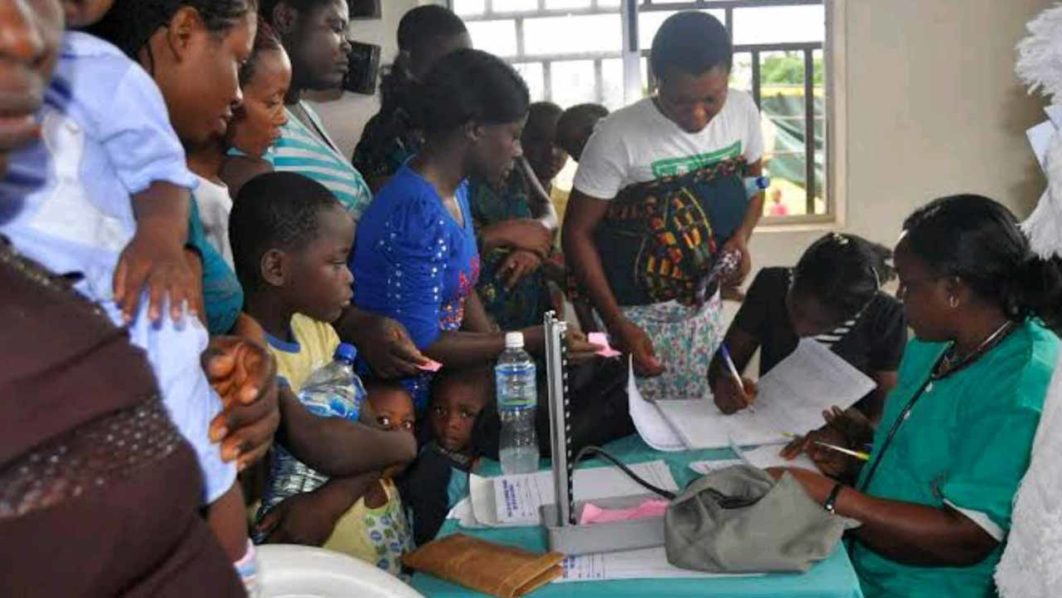
Nigeria spends more on healthcare than almost any of our neighbours – but we have very little to show for it. But why can’t we use our digital genius to fix that?
In fact – despite an almost five-fold increase in health spending since 2001 – we continue to have far worse health outcomes than countries that spend a lot less.
Individual health expenditure in our nation rose from $19 per person per year in 2001 to $84 in 2019. We spend the third highest amount on healthcare in West Africa.
But Nigerians still have an average life expectancy of 54, the fifth lowest in the world. If you are born in Ghana instead of Nigeria you will live 10 years longer. If you are Swiss or Japanese, you can expect to live for three decades more than the average Nigerian.
Nigeria has 20 per cent of the world’s maternal deaths – deaths of mothers within a year of giving birth – despite Nigerians making up just 2.6% of the world’s population
And we have the fourth highest levels of infant mortality on Earth. Our children are more likely to die before the age of 5 than their counterparts in countries like Somalia with long-term civil instability.
As a businessman, I find the return on our national investment unacceptable.
As a father and a proud Nigerian, I find it scandalous.
For comparison, Senegal, with a lower GDP and 30 per cent less health expenditure enjoys much lower mortality, higher life expectancy and lower levels of disability than Nigeria.
Of course we need infrastructure improvements to improve access to healthcare – particularly in rural areas – but a recent international study of Nigeria’s healthcare system had other valuable suggestions too.
The report, published by the globally-recognised medical research journal, The Lancet, highlighted the backward state of record keeping in the Nigerian healthcare system, stating: “Such is the ‘near-absence’ of records that only one in 10 deaths is registered, creating a paucity of data that makes it impossible to take rational decisions about healthcare priorities.
“We call on the Federal Government, working with state governments, to fund and lead the development of standards for the digitisation of health records and better data collection, registration and quality assurance systems.”
The report also calls for: “A National Medical Research Council with 2 per cent of the health budget and central government funding to award competitive peer reviewed grants (to) support high quality evidence and innovation.”
Digital innovation is something Nigeria does excel at. We are an innovative nation. No African nation has as many unicorn technology businesses – those valued at over $1bn – than Nigeria.
Can’t Nigeria’s natural genius for digital technology do for healthcare what we have already done for fintech?
Put simply, the federal government needs to work with our innovative digital firms to close the intelligence gap in our healthcare system.
As it is so often the case, our democratic shortcomings are at the heart of our failure on healthcare.
As the Lancet report puts it: “Health lies at the core of national legitimacy and that, without it, the foundations of democratic government are shaken in a country that boasts Africa’s largest economy and is home to about one in five people on the continent.
“If the country confronts its toughest challenges—a complex political structure, weak governance, poor accountability, inefficiency, and corruption—it has the potential to vastly improve population health.”
It is not just our healthcare that needs to be more digitally accessible and transparent. Our democracy does too.
At the digital democracy campaign I lead, we are dedicated to developing simple technological solutions to closing the gap between politicians and the people they serve.
Our free Rate Your Leader app allows registered voters to directly communicate with local politicians – building trust, transparency and accountability, and allowing a two-way flow of information which educates and benefits both parties. This dialogue in turn builds confidence in our political institutions and processes.
Rate Your Leader lets decision makers show themselves to be accessible, accountable and responsive to the people who decide whether or not they’ll have a job after the next election. It also gives them real-time insight into the things that matter most to the people who elect them – and how to address them. Things like access to healthcare.
Health is central to the development of any country.
“(The Lancet report) provides a number of excellent recommendations, some of which are already being implemented but many of which we will carefully consider,” said Vice President Osinbajo recently.
Let us hope that digitisation of our healthcare system is one of the changes that are implemented or considered – not least when our digital industrials have the skills and solutions we need to deliver it.
Joel Popoola is a Nigerian tech entrepreneur, digital democracy campaigner and is the creator of the free Rate Your Leader app. Follow him on Twitter @JOPopoola
[ad unit=2]






